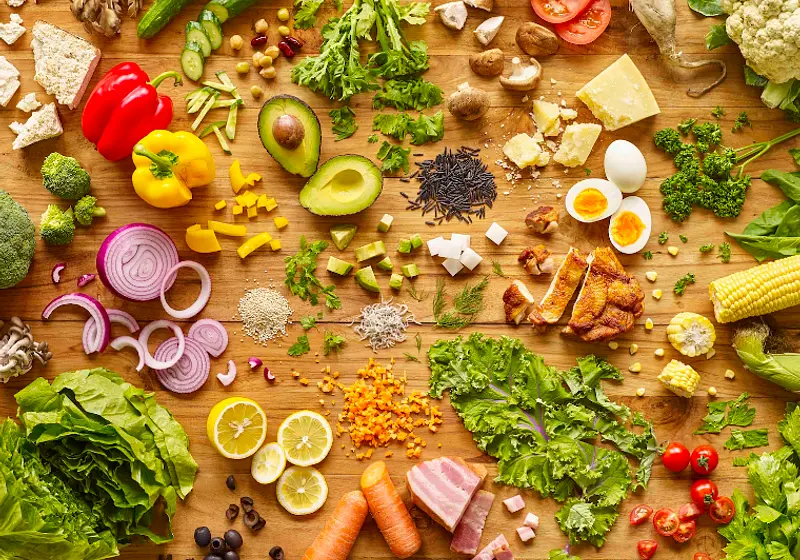A bowl of Ramen. A serving of braised chicken. A slice of wheat bread.
Have you wondered where these foods come from, how they are made, and what they contain? Food is a fundamental for life, and it is this very reason that makes it easy for people to neglect its importance and complexity.
Let us slide into your dms 🥰
Get notified of top trending articles like this one every week! (we won't spam you)The Food System in Brief
To begin with, the production of food goes through a much more complicated process than harvesting vegetables from your backyard. While many foods are rich in nutrients, more and more food products are made with inorganic, fatty, and cheap formulas that may be visually appealing and flavorful but not entirely healthy.
The cost of consuming these tasty foods is the intake of genetically modified crops, chemical substances, and artificial flavorings. This harm to consumers’ health––including the increased risk of obesity, cancer, and other illnesses––worsens the problem.
So who is to blame for the E. Coli outbreak in 2006 and the increasing rates of diarrhea in America? To completely throw the burden on large food manufacturing companies is the easy answer, but there needs to be someone to complete the job. Therefore, the solution does not lie in shutting down inorganic farms, large slaughterhouses, and food processing factories worldwide, but rather in being educated about the issue, supporting local farmer's markets, and buying organic produce.
Take the Quiz: Which Indian city is the perfect holiday spot for you!?
Let's match you with an Indian city that you would love!
Food Waste
According to a recent report in March 2021 from the United Nations, roughly 17% of the food produced is wasted each year. The amount of food waste accumulates to over $2 trillion spent on occupying 30% of fertile agricultural lands that could be used for more efficient and useful purposes. As the world population is estimated to reach 9 billion by 2050, which is an additional 1 billion to the current population, the global issue surrounding food waste must be addressed and solved in order to ensure enough resources and food are available in the near future.
Reducing food waste for every meal you eat and informing more people about the urgency of the problem are the first steps to take. After that, it will simply be a matter of time and persistent effort. In the end, only a combined effort from all countries and residents can improve our food system.
“Nutrition isn’t just about eating, it’s about learning to live.” —Patricia Compton, professional nutritionist and dietitian
I recommend watching the John Oliver’s Last Week Tonight video on food waste to learn statistics and hear a summary about food waste in America.
Food and Our Environment
Climate change is undeniably an urgent issue that needs to be prioritized. Food waste is a contributor to the increasing greenhouse gas emissions into our atmosphere as it produces excessive methane that traps heat nearly ten times more efficiently than carbon dioxide.
The rising temperatures across the globe poses a threat to our crops and farms, promoting the production of manmade substitutes for natural food. While substitutes like GMOs are abundant and are generally harmless, studies have shown that the side effects of consuming these unnatural foods can kick in years or even decades later.
Currently, the situation may not be ideal, but it is not irreversible. Starting from curing our planet by reducing food waste and halting global warming, we can bring healthy foods back onto our plates and reshape the food system back into its healthiest form.
Changes during the Pandemic
The COVID-19 pandemic is devastating but has brought about multiple benefits for the natural environment. For example, sharp declines in travel has greatly reduced pollution and greenhouse gas emissions, protecting wildlife habitats. To learn more about the hidden benefits and harms lockdown has brought to nature, this BBC article covers them very thoroughly.
Connecting back to the problem of food waste, an upward trend that trails back to spring 2020 is evident. According to civileats.com, multiple attempts to solve the issue have been halted, interrupted, or abandoned due to travel, gathering, and activity restrictions. Now, it is time to revive these efforts.
As a foodie and an individual passionate about nutrition, my interests have led me to explore the culinary arts. I encourage you to take full advantage of your time at home, take excessive attention away from your technology, and spend more time in the kitchen if you don’t already. Check out this website for a beginner's guide to simple recipes and inspiration for what to make for your next meal! Doing so can not only help to reduce food waste but also save you pockets of money spent on dining at restaurants.
Take Action
We are constantly working toward changes and improvements to better our society, but the efforts are not enough. Here's a recap of 3 simple ways you can help heal the food system and environment:
- Buy organic produce: choose organic foods when you can and support local farmer's markets
- Cook your meals: ensure you consume enough protein, vitamins, and other nutrients every day
- Compost: properly sort your trash to reduce food waste
Of course, it’s hard to embrace change and dedicate yourself to new customs. I suggest tracking your progress or creating a food blog to document your efforts. Feelings of accomplishment and fulfillment are crucial to keeping you motivated, as these ways have helped me persist in my work to improve my lifestyle and health as I become more aware and passionate about bettering the food system and reducing food waste.
There is so much more we can do in our daily lives. As Vincent van Gogh puts it, “great things are done by a series of small things brought together.” Waiting for problems to naturally heal themselves is not the solution.














